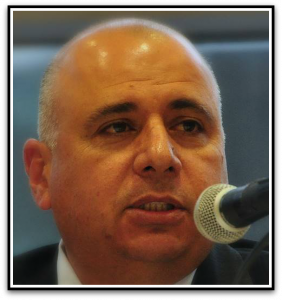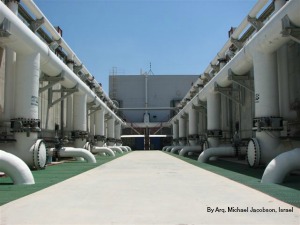 By Ori Nir
By Ori Nir
Israel has always suffered a water shortage. Seven years ago, the shortage turned into a crisis. The Sea of the Galilee receded to an unprecedented low, as did the mountain aquifers. Under the slogan “Israel is drying up,” the government ran terrifying television ads, featuring Israeli celebrities whose photoshopped skin was cracking like arid earth and peeling off. My mother used to cover her eyes when these ads ran. “I can’t see it,” she would say. Concerned citizens took shorter showers and stopped using garden hoses to water their plants or wash their cars. Consumption dropped but not enough. The country’s dwindling reserves couldn’t meet demand.
Today, the state of Israel has solved its water problems. Four large water desalination and purification plants were built (two more are under construction), including one that until recently was the largest in the world. Today, more than half of Israel’s drinking water is desalinated Mediterranean water. There is a surplus of water, even as consumption grows.
 Since its birth in 1948, Israel has been, and still is today, a society of problem-solvers. From
security to information- technology, from immigration absorption to agriculture, from medical technology to
crisis management. The solutions are often drastic. At times ugly. Occasionally, solving one problem creates
another. But the creativity and dynamism of this vibrant society allows it to introduce change, accept it and
adjust to it.
Since its birth in 1948, Israel has been, and still is today, a society of problem-solvers. From
security to information- technology, from immigration absorption to agriculture, from medical technology to
crisis management. The solutions are often drastic. At times ugly. Occasionally, solving one problem creates
another. But the creativity and dynamism of this vibrant society allows it to introduce change, accept it and
adjust to it.
When it comes to peace, however, most Israelis seem to have resigned to the do-nothing policy of their leadership. Astonishingly, when it comes to Israel’s most critical existential problem, its relationship with its Palestinian neighbors, there is a sense among many Israelis – as is the case with many friends of Israel here in the U.S. – that this problem has no solution.
Israel’s water shortage used to also be perceived as an existential problem. It was. And for years there were many who saw no viable solution for it.
A solution for Israel’s conflict with the Palestinians exists. It’s viable, implementable, and necessary. Yes, it takes two to tango. And, yes, there is terrorism and Hamas and incitement and the settlers’ lobby. Sure. But these cannot become an excuse for doing nothing about the problem that most affects Israel’s future.
On Israel’s Independence Day, next week, I will celebrate Israelis, their ingenuity, their resourcefulness, their vitality and vivaciousness. I will cherish the hope that thrives in Israeli society for a better Israel. This is a society that knows how to do big things, and without a doubt has the wherewithal to end its occupation of another people, an occupation that doesn’t only deny the Palestinians the independence that they deserve but denies Israelis full independence and freedom. An occupation occupies not only the occupied, but also the occupier.
On this Independence Day, while celebrating Israel’s many achievements and many virtues, let’s recommit to ensuring the liberty and independence of Israel’s Palestinian neighbors. Because Israel’s full liberation requires liberating itself from the occupation.
Happy birthday, Israel! May a breakthrough toward peace grant us an opportunity to celebrate a happier birthday next year.